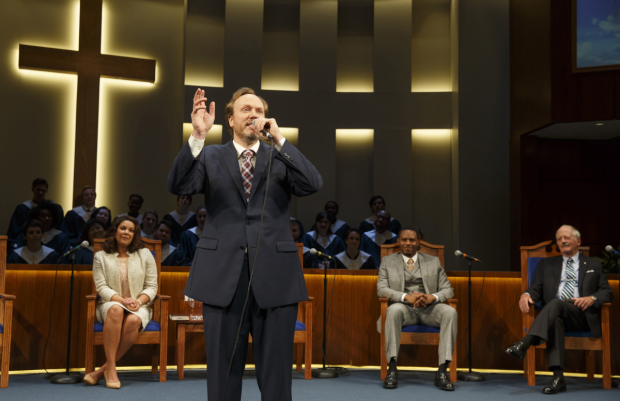The Christians
Lucas Hnath’s new play asks which is more convincing: the love of God or the wrath of Satan.

(© Joan Marcus)
Theater that panders to our preconceived notions is easy. Thankfully, playwright Lucas Hnath likes to take the hard way. This is dazzlingly apparent in his new play, The Christians, now making its New York debut at Playwrights Horizons. This challenging and unfailingly intelligent work brings an off-Broadway audience into the heart of a place few of them would be caught dead: a Christian megachurch. Even more amazingly, it makes us care deeply about that church and the people within.
The Playwrights Horizons mainstage has been transformed into a house of worship, complete with wood paneling, a glass pulpit, and royal blue upholstery (uncanny authenticity by set designer Dane Laffrey). One expects Joel Osteen or Creflo Dollar to appear at any moment, but instead we get Pastor Paul (Andrew Garman). Following in the footsteps of his upstart namesake, Paul built his congregation from a handful of friends into a flock of thousands. He's happy to announce that they've finally paid off the mortgage on their glittering new temple. It's easy to understand why this church is special: A multiethnic choir sings upstage, suggesting that it has not succumbed to the racial segregation that often marks evangelical Christianity in America. This is a church for everybody.
Pushing his inclusive vision even further, Pastor Paul makes a startling pronouncement: There is no hell, and nonbelievers are certainly not condemned to go there. He recounts a conversation in which God told him, "You wanna see Hell, you look around." Paul has become convinced that hell is an invention of cruel and vengeful humanity, not a merciful God who sacrificed his only son for our salvation.
Associate Pastor Joshua (Larry Powell) doesn't buy Paul's radical new direction. Assuming the role of Lucifer in his own reenactment of Milton's Paradise Lost, Joshua leaves the church with 50 congregants in tow — better to preach hellfire than serve a false gospel of heaven for all. While that's a drop in the bucket compared to the thousands who choose to stay, Elder Jay (Philip Kerr) is worried by this schism. Jenny (Emily Donahoe), a mild-mannered member of the choir, questions the timing of Paul's announcement: If he knew there wasn't a hell, why didn't he tell people earlier? Was he afraid they would no longer give so much money? Most difficult of all, Paul's wife, Elizabeth (Linda Powell), doesn't even agree with him. Everyone, including Paul, is forced to weigh the value of their convictions against the orthodoxy of their tribe.
Director Les Waters balances a staggering number of ideas and issues, allowing each of them space to breathe. Even in this cavernous church, he manages to craft some undeniably intimate moments with the help of Ben Stanton's subtly persuasive lighting design. As was the case with Hnath's A Public Reading of an Unproduced Screenplay About the Death of Walt Disney, the actors speak into hand microphones for much of the play (simple and effective sound design by Jake Rodriguez). This helps to accent the off-mic moments and also creates a conspiratorial relationship with the audience. A late scene in which Paul struggles with his faith is whispered into the mic, making us feel as if we're privy to his most private thoughts.
Sympathetic performances help us to connect with all of Hnath's characters. Garman's assertive yet gentle delivery makes you want to believe in his point of view. As Joshua, Larry Powell conveys an aching pain that is not just facile sanctimony. "It's not easy for me to believe in Hell," he says, sharing that his closest family members are nonbelievers and therefore damned. Donahoe gives the most transfixing performance of the show, managing to come off as simultaneously meek and pointed in her questioning of the pastor. These are not the toothy disingenuous zealots we've come to know as Christians from so many plays and movies. Hnath approaches the subject with disarming sincerity, which turns out to be the most refreshingly avant-garde aspect of The Christians.
Whether it's The Book of Mormon or Hand to God, the treatment of religion (particularly Christianity) onstage has been decidedly snarky in recent years. An informal straw poll outside the theater suggests why: When asked to position themselves on a scale from believing in a "higher power" to completely disbelief, the audience at Playwrights Horizons crowded the atheist extreme. It is a testament to Hnath's storytelling prowess to hear their cynical guffaws evaporate into rapt silence as an off-Broadway audience becomes totally invested in a theological debate and the recognizably human people having it.











